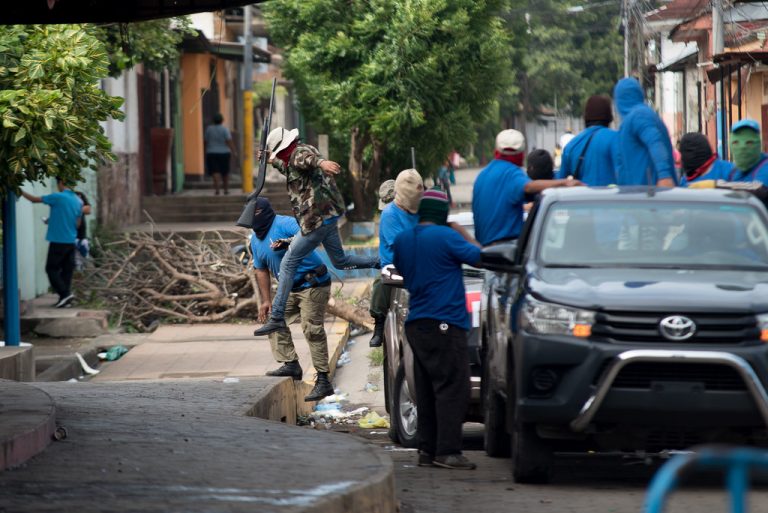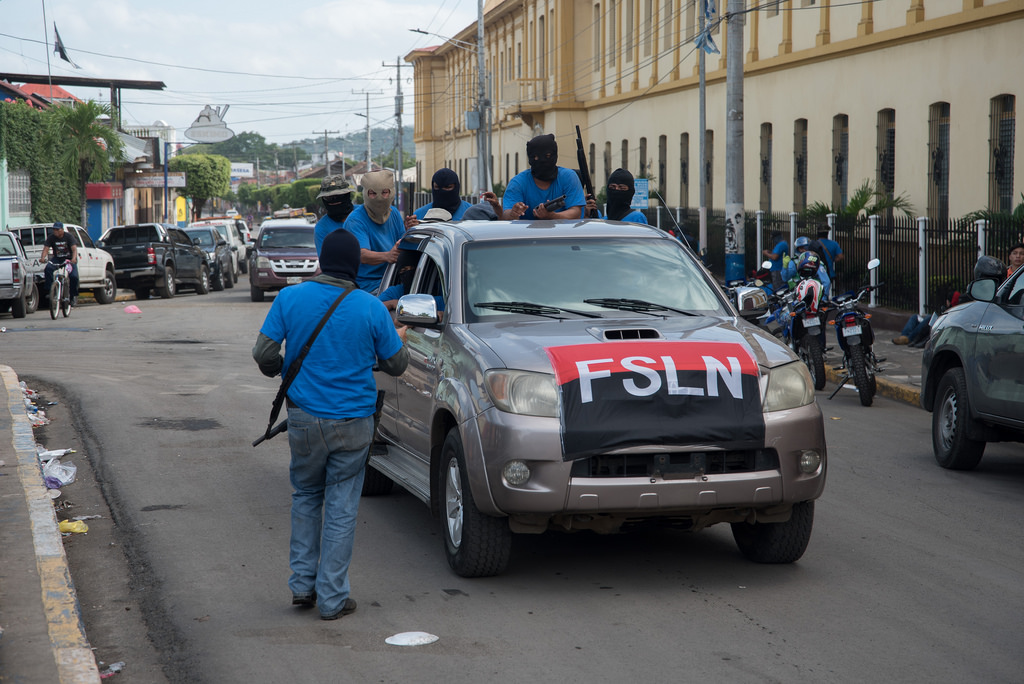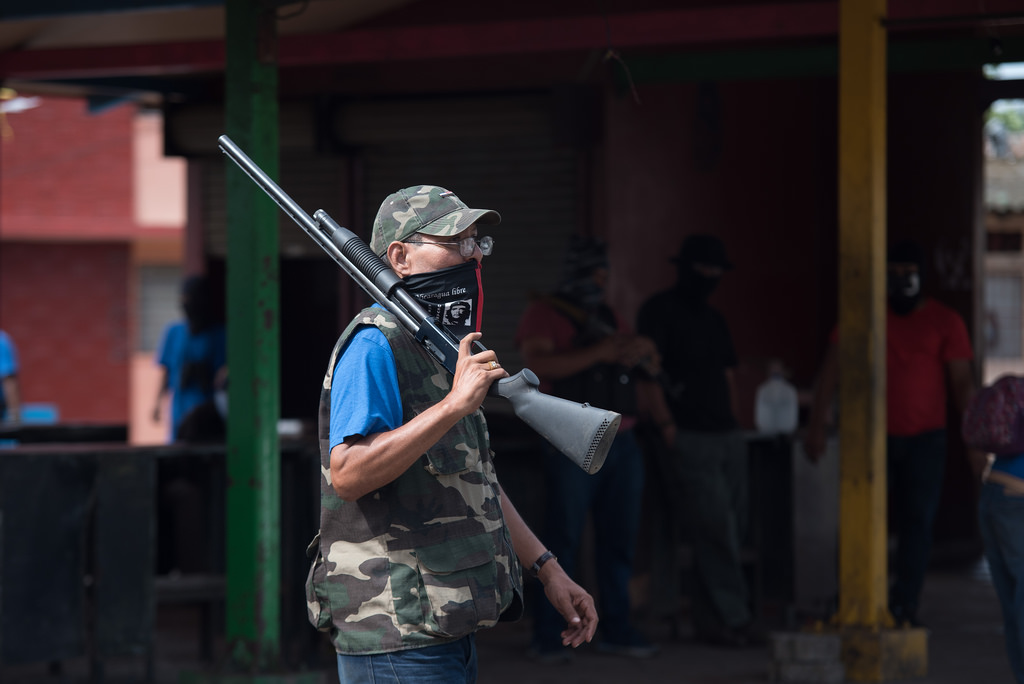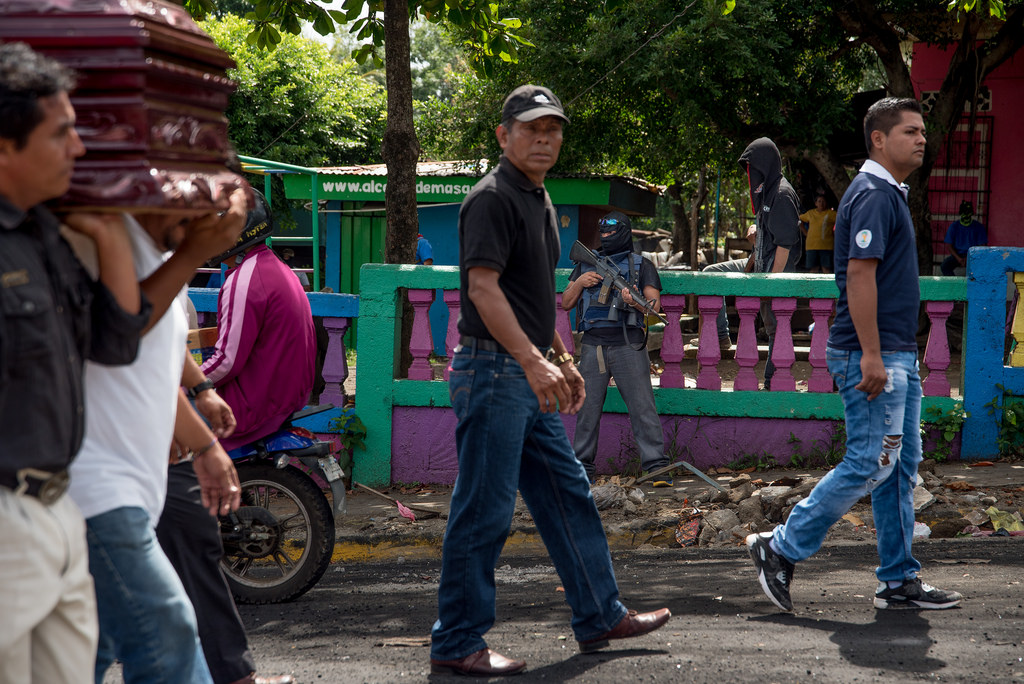23 de julio 2018

Children of Exile: The Births “Sowing Hope” in the Camp of Nicaraguan Farmers

PUBLICIDAD 1M
PUBLICIDAD 4D
PUBLICIDAD 5D
Monimbó, heart of the resistance, is under military occupation. And the thugs celebrate with sarcasm

Carlos Herrera | CONFIDENCIAL.
The drums and the street hawkers were suddenly quiet as the funeral procession passed by. Rafael Palacios Aguilera, a 33-year-old carpenter, died on Tuesday, as paramilitary units loyal to Daniel Ortega laid siege to Masaya. Mourners marched through the streets of this courageous neighborhood, heads held high, while Ortega's "blue shirts," masked, armed and smiling, barely took notice. Like an occupying army waving FSLN banners, they patrolled the streets, played basketball on the public courts, took naps in the doorways of houses shut tight in repudiation. Monimbó, heart of the resistance, is under military occupation. And the thugs celebrate with sarcasm.
At nine in the morning on Wednesday, the streets of Monimbó sizzle with suffocating heat. The sky is cloudy, but the humidity feels like a boxer's blow to the chest. The neighborhood looks as if it's been hit by a tornado or leveled by an earthquake: dozens of barricades that a few weeks ago blocked access to this mythic barrio, had been destroyed by hooded men who now –with Ortega's blessing– were the sole authority. The pavements were strewn with broken glass.
The siege began at 6 am and lasted for seven hours: hundreds of men armed with high-caliber weapons attacked a population that defended itself with handmade weapons and crude mortar-launchers. The exact number of dead is still unknown, but CONFIDENCIAL was able to confirm the deaths of two young men in the trenches: Josué, the carpenter, and 34-year-old Erick Antonio Jiménez López, shot in front of his house.
Once the barricades came down, the hunt began. The dictator's "blue shirts" broke down the doors of those considered rebels, critics of the regime, or active participants in the trenches. Dozens were captured or "disappeared," the spoils of war to be processed or traded in future negotiations. The few people in Monimbó who dared to talk said that dozens of people, mostly young men, fled the area and took refuge in the high plains dampened by Masaya's nearby lagoons. The fear of being captured or killed by the occupying forces keeps them in hiding. Those who've stayed in Monimbó shut their brightly colored doors and windows. It’s as if the town had been abandoned or attacked by a plague.

Carlos Herrera | CONFIDENCIAL.
It must be terrible for the inhabitants of this war-torn town, with its history of resistance dating to colonial times, to see its streets violated by grotesque, armed men shouting "Viva Daniel!" One of them, called "the Spark," stands beside a blue pickup truck, where the mother of all mortar launchers, "La Niña," is displayed as a trophy. The Spark explains that their job is to liberate "the people" from the claws of a few "delinquents," who stubbornly obstruct the right of free passage. "We support the government," he says, and we will "neutralize" any act of war.
This man, who hides his face behind a ski mask, claims those who erected the barricades are directed by "the right," without specifying any particular group. In turn, this "right," he says, receives financing from the United States and then pays Colombian narco-traffickers and Salvadoran gangs to oversee the rebels of Monimbó. Yet the only ones with real weapons, the "blue shirts," refuse to say how they acquired them. "We don't kill anyone. We just capture them and turn them over to the police," says another masked man, in essence admitting that they act with impunity and under the protection of an institution run by Ortega, as supreme leader.
The hundreds of "blue shirts" stationed in Monimbó claim they are workers, owners of small businesses like pizzerias, who felt obliged to act against the defenseless because the country is under siege. They say their goal is peace. "This was the last holdout and now it's been liberated, says another masked man who seems to be the leader of the group, the one who grants permission to film or take photographs. "We came to ensure free transit," he says, as truck caravans pass by flying black and red flags and filled with hooded men shouting "Viva Daniel!"
Last Friday, they greeted Daniel Ortega in Masaya, while its residents stayed behind closed doors. Unnerved by this rejection, Ortega chose to deliver his speech in the local police garrison, draped by Masaya’s police chief, Ramón Avellán, the man who for weeks had been under siege in his own garrison by people demanding his surrender. Ortega greeted Avellán warmly and thanked him for clearing out the city so he could arrive in conquest. He stood for photographs with the hooded men, the police and paramilitaries, without distinction. He spoke briefly, with his wife, Rosario Murillo, at his side, visibly nervous, her gaze shifting from side to side. “People already feel free,” says the Spark. “They’ve lost their fear. The mobilization is permanent.” In other words, they will occupy the city to prevent the barricades from rising once again.

Carlos Herrera | CONFIDENCIAL.
Despite the military occupation, Masaya’s inhabitants say they are prepared to resist. Ramiro, a youth who’s suffered through the weeks of attacks, says people here “prefer to prevent death” rather than carrying on an unequal struggle. “Many have fled because they don’t want to die, not because they are afraid. The war isn’t between equals; the kids fight with hand-made weapons. They’ll never win against the weapons the other side carries,” he says, referring to the paramilitaries. He says the people will invent new forms of resistance against the regime; Masaya, especially Monimbó, will never give up.
Jairo, a 39-year-old electronics technician, is one of the few people in Monimbó who opened his doors on Wednesday. Sitting on the curb while he worked on an electronic gadget, he calls the battle of the trenches a stupidity and says he’s glad the blue shirts have arrived to tear down the barricades. “They held the whole city hostage,” he says. “Now we can get back to work, because they didn’t let us work.” He says he doesn’t take sides, but rages against those protesting against Ortega in Monimbó. These are the differences that wound this neighborhood, so famous for its music, its dance and its crafts. “They threatened and threw bombs at us just for not thinking as they do. We had to stay quiet. They made a mess of things.”
Jairo, the technician, also said he rejects the National Dialogue convened by the Episcopal Conference of Nicaragua in an effort to find a solution to the current crisis. His eyes shine with anger when he speaks of the bishops. “I don’t want to hear any more about these priests,” he says. “I used to be a Catholic, but I know that beneath those robes are evil men. I’ll never be a Catholic again. They are shameless.”
Although Jairo claims he is non-partisan, he is living proof that the hateful discourse unleashed by Rosario Murillo has found resonance in sectors of the population. Murillo, who controls content on at least five television stations and various radio stations, launches daily tirades — laced with religious references and prayers — against the thousands of Nicaraguans demanding an end to the regime. She catalogues them as “vandals,” “plagues,” “delinquents,” “vampires,” “terrorists,” “coup-plotters,” and “devils.” “They will not succeed!” she exclaims.

Carlos Herrera | CONFIDENCIAL.
Two days later in Monimbó, one of these “devils” is buried. The funeral cortege of the carpenter, Josué Palacios Aguilera, advances to the music of a group called “Among Friends,” playing Juan Gabriels’ mournful tune, “Eternal Love.” Josué’s wife, Roxana, leads the procession, along with his father, Jose Ariel Palacios, 54 years old and also a carpenter. The wife, dark-skinned, short and slim, could barely speak, but Jose Ariel said his son died of a bullet to the stomach. He bled to death because his relatives weren’t allowed to help him or later even recover his body. He leaves behind three children ages ten, seven and one. Jose, who in his youth fought against Somoza behind the barricades of Monimbó, said he was repulsed at seeing Ortega’s hooded men take over the city.
The procession moves along the empty streets of Monimbó, to the rhythm of “Among Friends,” while dozens of men in ski masks, armed with rifles, hang around idly, or play basketball on the public court. The carpenter’s relatives endure the indignity of walking past these killers, but without bowing their heads or turning to look at them. José Ariel Palacios says his heart beats with hatred: “I’d like to kill them all,” he says. “I want Daniel Ortega to go.” Blood will continue to be spilled in Monimbó, he warns, until Ortega decides to leave the Presidency. Will this town give up? “No,” he responds. The guerrilla kettledrums will sound again in Monimbó.
PUBLICIDAD 3M
PUBLICIDAD 3D